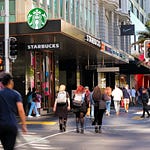TLDR & TLDL: This week the Government set the terms and conditions for the summer, the Reserve Bank signalled borrowers may have prove they can handle a 7% mortgage rate, Judith Collins launched a kamikaze attack on Simon Bridges, and, Adrian Orr rejected the idea that the 40% rise in house prices since Feb last year was catastrophic for anyone other than a few first home buyers.
Elsewhere, the ‘Omicron’ Covid variant emerging from South Africa was described as potentially more dangerous than Delta, and triggered a slump in stock and oil prices this morning. Trump appointee Jerome Powell was reappointed as US Federal Reserve Chairman for another four years, reassuring some worried that a potential Democrat appointee, Lael Brainard, would be even more of a money printer.
Coming up in the week ahead, the Government will decide on Monday which colour ‘traffic lights’ we’ll all be on from Friday and use the last non-Parliamentary sitting week of the year to prepare for a final sprint to Dec 15, when summer has to start.
(This is the weekly ‘sampler’ email and podcast for both free and paid subscribers that includes the ‘Weekly Hoon’ podcast above with Peter Bale and me that was recorded last night in a webinar for paid subscribers. The links to this week’s articles go to the paywalled versions. But I’d love the free subscribers reading the detail and analysis below to subscribe fully to join our community and see all my reporting and analysis. It also makes my version of accountability and explanatory journalism about affordable housing, climate change policies and child poverty financially viable)
The five things that mattered this week
1. ‘We can’t wait for everyone to get over 90%’
The Government decided on Monday that all parts of Aotearoa-NZ would join the ‘traffic lights’ system from next Friday, even though the original Oct 22 plan was to wait for all DHBs to be 90% double vaccinated. At current vaccination rates, only the Auckland and Capital and Coast (Wellington) DHBs will be 90% fully vaccinated by Dec 3. The ‘laggard’ Lakes, Tairāwhiti, Whanganui, West Coast and Northland DHBs are unlikely to get there until February.
Essentially, the Government decided the nation couldn’t wait until next year to join the traffic light system, which basically allows potential super-spreader venues and workplaces to reopen for vaccinated customers, staff and suppliers who have passes.
It bought itself a couple of weeks extra time to vaccinate more of the most vulnerable outside Auckland by delaying the opening of Auckland’s borders until Dec 15, but it softened the blow by deciding checks for vaccination passes or negative tests at the border would be via spot checks with $1,000 fines, rather than the current hard border.
So far, the delta outbreak seems to be plateauing around 150-200 cases a day, with hospitalisations below 100 and ICU bed usage below 10. Delta has yet to spread in earnest much beyond Auckland, but many fear a fuller opening and the inevitable widespread movement of Aucklanders up and down the country for the summer will start outbreaks in the remoter and less-vaccinated regions such as the East Coast, Northland and Taranaki/Whanganui. Maori health experts didn’t want the opening and are asking Aucklanders to consider not travelling to those regions.
In summary, here are the ‘Ts & Cs’ for summer:
cafes, shops and larger workplaces can fully reopen to those with vaccination passes in Auckland and the rest of Aotearoa-NZ on Dec 3;
Aucklanders can finally leave (and others can pass through or come to) the city through cordons with spotchecks at the boundaries from Dec 15 (Beehive);
vaccinated and negative-tested NZ residents can come home from Australia without having to go through MIQ from Jan 17 as long as they self-isolate and test negative again for seven days;
vaccinated NZ residents can return from the rest of the world from Feb 14 as long as they self-isolate;
vaccinated non-resident students, tourists and (a few) migrant workers can come in without going through MIQ from April 30 (Beehive);
health, education, Police, prison, border and Defence Force staff must be vaccinated (Beehive);
but other private sector workers such as those in construction, retail and hospitality, and other public sector employers such as Kāinga Ora, Oranga Tamariki and MSD don’t have to be vaccinated (although they can use a risk assessment framework to put their own mandates in place)(Beehive); and
businesses can start using rapid antigen tests from Dec 1 and the public can start buying off-the-shelf rapid antigen tests at pharmacies to be administered by pharmacy staff from Dec 15 (Beehive).
Labour’s support dropped 5-10 percentage points towards 40% since the elimination strategy failed in September and it became clear the Government had not developed a clear enough and detailed enough back-up plan to ‘live’ with delta should short, sharp and wide lockdowns fail to stamp it out.
The Dec 3 and Dec 15 reopening dates were the last realistic dates for reopening for summer, which PM Jacinda Ardern had promised, without leaving lower-vaccinated areas too exposed, and while arresting Labour’s slide in the polls. Perhaps ironically, the die was cast on these T&Cs and the Govt’s political rearguard action just days before the National caucus’ latest self-immolation.
Number of the week: 42.4% - The percentage of Murupara’s 1,390 eligible residents that are fully vaccinated as of Nov 24. The town’s two GPs have stopped working from its clinic because they aren’t vaccinated. There were 662 residents yet to be vaccinated as of Wednesday.
Chart of the week: This Stuff chart shows the towns in each decile with the highest percentages without any Pfizer doses. Each red dot represents a suburb and the shade of red represents the number of people unvaccinated. Decile 9 and 10 towns predominate. Vaccination rates are highly negatively correlated with deprivation.
2. ‘Why can’t they come home for Christmas?’
Earlier this week real momentum was building behind calls from distraught families, National, ACT, tourism businesses and Air NZ for vaccinated Kiwis stuck in Australia to be allowed to come home outside the MIQ system by self-isolating at home for seven days.
A surprise call from Otago University’s crack team of epidemiologists for the govt to allow vaccinated travellers to come in without having to stay in MIQ galvanised the issue.
“Analysis of countries with reasonable quality data implies that the risk of Covid-19 infection for most vaccinated international arrivals is typically less than the current risk for Auckland residents. Current MIQ requirements for vaccinated arrivals to Auckland could therefore be dropped for most, without increasing the risk for Aucklanders,” Dr Lucy Telfar Barnard, Dr Jennifer Summers, Lesley Gray, Prof Michael Baker, Prof Nick Wilson wrote in an Otago University post on Nov 8.
But PM Jacinda Ardern and Covid-19 Minister Chris Hipkins ended the debate this week by deciding not to start self-isolation for vaccinated residents returning from Australia until Jan 17, and until Feb 14 for residents coming from beyond Australia.
They argued the potential for extra cases could add “cumulative risk”of much deadlier ‘nodes’ of new outbreaks, but the Opposition argued the returning New Zealanders would be no more dangerous travellers than those leaving Auckland.
Air NZ was among those throwing its hands up in frustration when the Cabinet decision came through, cancelling 1,000 flights due to arrive in NZ before the end of 2021. That shredded any remaining hopes those in Australia had to get home for the summer.
The trouble is the Government is failing to paint a compelling picture of how risky allowing in vaccinated travellers would be.
Dr Ashley Bloomfield confirmed to on Wednesday the Ministry of Health’s modelling showed just 60 extra cases a week were expected if self-isolation was allowed for arrivals of vaccinated travellers. He argued they could cause more lethal outbreaks than other travellers, given higher estimates of their transmissability (r values of 5 to 6).
The prospect of less than 10 extra cases a day on top of the existing 200 or seemed a low risk to take for those watching the prospect of a ‘normal’ summer and family reunions fading away into the distance.
3. ‘We won’t lend you more than 80%’
I reported this week on a mini credit-crunch that has started in recent weeks as banks clamp down on riskier mortgage lending to keep within tighter Reserve Bank LVR restrictions from Nov 1 and to comply with stricter new rules on responsible lending due to kick in next Wednesday.
Kiwibank, BNZ and ANZ have all now stopped lending more than 80% to ensure they keep within the Reserve Bank’s speed limit.
4. ‘Non. Je ne regrette rien’
Reserve Bank Governor Adrian Orr rejected the idea that the 40% rise in house prices since Feb last year had been a catastrophe, saying instead on Wednesday the surge had been good for homeowners and kept workers in jobs. He indicated the bank could not be held back from doing its job by the needs of first home buyers.
He repeated that house prices were unsustainable, but the bank forecast another 10% rise in prices over the next year, before they eased back around 5% in 2023. The Reserve Bank hiked the OCR as expected by 25 basis points and lifted its OCR forecast track by around 50 basis points to a peak of 2.6% in early 2024.
5. Ready for a mortgage rate serviceability test floor too?
The Reserve Bank started consulting this week on the details of two new rules to restrict riskier mortgage lending and be able to cool the housing market without necessarily lifting the Official Cash Rate.
It went into more detail about creating an official mortgage serviceability test floor that means borrowers would have to be able to prove they could afford a mortgage with the assumption of a higher interest rate, possibly around 7%. That’s higher than the 6% floor that banks currently use internally and suggests the Reserve Bank could effectively tighten credit to the mortgage market without having to put up the OCR.
The bank would prefer to bring in the floor first next year, before swapping it for a debt to income multiple limit, possibly starting at 6, towards the end of next year.
Quotes of the week
‘He/she said what!’
“This evening, with unanimous support of the board of the National Party, Simon Bridges, Member for Tauranga, has been demoted and relieved of his portfolio responsibilities. The decision follows an allegation of serious misconduct relating to Simon Bridges' interaction with a caucus colleague.” Judith Collins wrote in a late-night press release that referred to a five-year-old incident where Bridges joked with colleagues about how to make a baby girl, which was overheard by MP Jacqui Dean.
‘She’s gotta go’
“It’s truly desperate stuff.” Simon Bridges the next morning on the way into a caucus meeting where Collins was rolled.
Onwards and upwards
“This is not our best day, but we will raise our eyes to the sky.” Interim National Leader Shane Reti speaking after the caucus voted out Judith Collins in the wake of the statement above.
Chart of the week


Longer must-reads and listens elsewhere this weekend




Comment of the week in The Kākā community
“Hi Bernard, long time listener first time caller. I have an existential question for you. Firstly, love your work, thanks for all that you do. But it stresses me out. As a millennial home owner I am a super privileged beneficiary of the massive intergenerational Wealth transfer that we love discussing. Like I said I’m very engaged with the news and am always very interested in your perspective. But as a relatively normal but privileged person, what can I be doing to be a better member of society. As at this point learning as much as I can about issues / the economy is freaking me out but I’m not sure how to transfer that into something constructive???.” Tessa Williams in this week’s Ask Me Anything.
Some fun things
Have a great weekend
Bernard


















